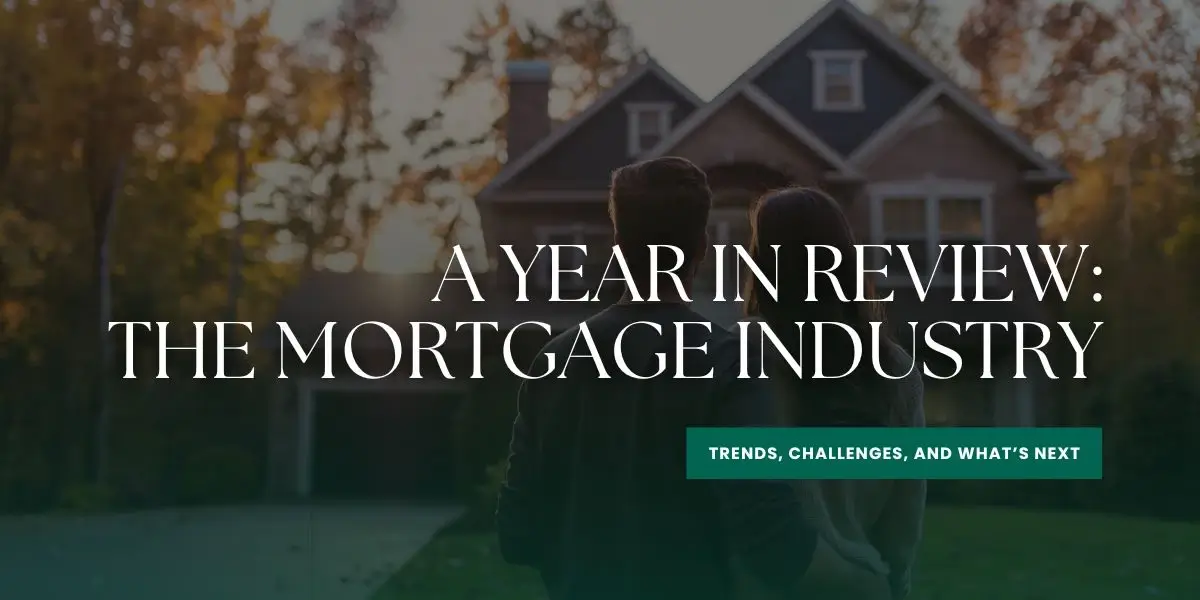

2024 brought notable developments in the mortgage industry, influenced by advocacy efforts, economic shifts, and evolving regulations. As 2024 wraps up, these changes reflect the complexity of today’s housing market impacting realtors, lenders, and borrowers. Let’s explore some of the significant trends that defined the industry this year.
Advocacy Efforts:
Many shelter industry advocacy groups, like the Community Home Lenders of America (CHLA), focused on several important issues for the benefit of consumers and to support housing affordability.
- Successful efforts to update and expand FHA’s 203(k) renovation loan program became effective in November. Hopeful homeowners purchasing an aging home now enjoy an increase in the amount of renovation costs that may be financed, a longer period of time to complete renovations, and other enhancements to expand renovation lending and enhance housing affordability.
- Condominium regulations tightened with a broad brush have adversely impacted smaller and low-rise projects, new and existing, creating a barrier to an affordable housing option. Industry advocates are working with Fannie Mae, Freddie Mac, and FHA to improve the lender review process and recognize areas of improvement to better serve buyers and sellers in this important housing space.
- Eliminating most trigger leads is close to success. Trigger leads occur when a borrower’s credit inquiry for a mortgage ‘triggers’ a pay for lead practice resulting in borrowers receiving up to 100 unsolicited calls, texts, or emails often offering non-compliant offers of credit. Trigger lead practices overwhelm and confuse consumers in an already complex lending transaction. Borrowers accuse lenders of selling their personal information, when in fact, the credit reporting agencies are selling the borrower’s lead when a credit report is initiated.
- Keen focus continues on the rising costs of credit reports and how to rein in the cost. The mortgage industry has faced steady increases in the price of pulling a borrower’s credit report adding to overall loan expenses. Credit report expense has risen 400% since 2019 and as we head into 2025, another price hike is expected. This rising cost trend is increasingly becoming a burden to consumers and lenders alike.
Compliance Costs and Their Impact on Borrowers
The cost of regulatory compliance in new home construction continues to rise, largely due to stricter standards on energy efficiency, safety, environmental factors, and state and local restriction on land use and development. For builders, these compliance costs increase construction expenses contributing to higher home prices. From the borrower’s perspective, price increases impact affordability and restrict first-time buyers or those with lower incomes. As higher property values demand higher loan amounts or incomes, borrowers find it increasingly difficult to qualify for home loans without stretching debt-to-income ratios.
Rising Homeowners Insurance Costs, Agency Loan Limit Increase, and Cash Transactions
2024 saw a surge in homeowners insurance rates which affect borrowers’ purchasing power. Higher premiums have forced many borrowers to scale back their purchase price or delay homebuying altogether. In some communities, property insurance is becoming harder to secure with many large insurance companies eliminating coverage in disaster prone areas. Some experts report that insurance premiums have been underpriced. Insurance rates will likely continue an upward trend, a further challenge to housing affordability.
To counteract rising home prices, agency loan limits will increase this year allowing borrowers to finance larger amounts without needing to apply for jumbo loans. By the time this article publishes, it is expected higher agency loan limits will be announced and the Fannie/Freddie loan limit will have almost doubled since 2019.
Another interesting trend this year is the prevalence of cash transactions, with over 30% of real estate sales occurring without financing. This shift highlights the influence of investors and high-net-worth individuals in the market, often putting financed buyers at a disadvantage. Cash buyers can close deals faster, sometimes pushing prices higher in competitive markets.
Fair Housing, Election Results, Reconsideration of Value, and the NAR Settlement
The Fair Housing Act has remained central to lending practices with ongoing emphasis on equitable lending and preventing discrimination. With a change in US leadership, housing and lending policies may shift. Affordable housing, lending and shelter industry regulation, and possibly interest rate policies are up for reconsideration depending on the new administration’s agenda and realistic outcomes based on law and human-interest concerns.
Reconsideration of Value (ROV) guidance has finally been provided. Effective in October, borrowers are given the opportunity to formally request a Reconsideration of Value when the borrower believes the report is inaccurate, deficient, or reflects discriminatory practices. Borrowers are provided a disclosure providing their right when applying for a mortgage loan.
The NAR settlement made headlines. The new landscape of buyer-seller commission structure created a ripple within the mortgage industry. At the time of the settlement, there was little guidance from the agencies on how to apply the NAR ruling to most mortgage underwriting guidelines. Since that time, agencies have slowly introduced guidance to address borrower paid commission. Flexibility in underwriting guidelines is important, as the negotiation and payment of real estate sales commission may depend on supply and demand of marketable properties and the ever-changing economic environment going forward.
Cybersecurity and Automated Intelligence
Cyber threats have escalated, and cybersecurity continues to be a pressing issue in the mortgage industry. Increased attempts at data breaches and fraud have pushed lenders to enhance digital defenses and train staff on best practices to protect borrower data, reflecting the industry’s commitment to safeguarding sensitive information. Automated Intelligence (AI) is advancing at lightning speed and will require lenders to use tools and resources to prevent a new level of fraud and misrepresentation while handling borrowers’ most private and confidential personal data. Preventing cybercrime takes all parties working together to prevent an unfortunate loss of confidential data and money.
Concluding Thoughts
The past year has been shaped by a range of factors - advocacy for fairer practices, rising compliance costs, and adjustments in lending guidelines - all of which have impacted borrowers’ access to and affordability of homeownership. In 2025, these trends set the stage for an industry adapting to economic shifts and regulatory challenges while striving to serve an evolving housing market. The great news is, there is a significant number of hopeful homeowners waiting to enter the market. As a shelter industry stakeholder, we live and write history every day while emerging from a post-pandemic era working toward a new normal, not yet defined.
Kim S. Curtis (NMLS ID #100165) is the President & CEO of Tidewater Home Funding based in Chesapeake, VA. Celebrating its 25th anniversary in 2025, Tidewater Home Funding is proud to serve the mortgage needs of families across Virginia, North Carolina, and Florida. Additional information about the company is available at tidewaterhomefunding.com. NMLS ID #41552. Equal Housing Lender.

